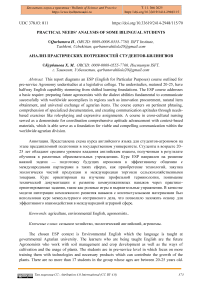Practical Needs’ Analysis of Some Bilingual Students
Автор: Qurbanova H.
Журнал: Бюллетень науки и практики @bulletennauki
Рубрика: Социальные и гуманитарные науки
Статья в выпуске: 6 т.11, 2025 года.
Бесплатный доступ
This report diagrams an ESP (English for Particular Purposes) course outlined for pre-service Agronomy understudies at a legislative college. The understudies, matured 20-25, have halfway English capability stemming from shifted learning foundations. The ESP course addresses a basic require: preparing future agronomists with the dialect abilities fundamental to communicate successfully with worldwide accomplices in regions such as innovation procurement, natural item obtainment, and universal exchange of agrarian items. The course centers on pertinent phrasing, comprehension of specialized documentation, and creating communication aptitudes through needs-based exercises like role-playing and expressive assignments. A course in cross-cultural nursing served as a demonstrate for coordination comprehensive aptitude advancement with context-based materials, which is able serve as a foundation for viable and compelling communication within the worldwide agrarian division.
Agriculture, environmental English, agronomists
Короткий адрес: https://sciup.org/14132844
IDR: 14132844 | УДК: 378.03: 811 | DOI: 10.33619/2414-2948/115/70
Текст научной статьи Practical Needs’ Analysis of Some Bilingual Students
Бюллетень науки и практики / Bulletin of Science and Practice Т. 11. №6 2025
UDC 378.03: 811
The chosen ESP context is Environmental English which the language is taught at governmental Agrarian university. The learners who are being taught English are the future Agronomists who work with soil management and crop development as well as the ways of cultivation and the usage of plants. The students are in pre-service level in which focus on more training them with technologies and necessary products which can contribute the growth of the plants. There are no more than 17 students in the group whose ages are between 20-25 years old.
Бюллетень науки и практики / Bulletin of Science and Practice Т. 11. №6 2025
The group has mixed genders including 9 boys and 8 girls in the class. As they are second course students there, they are not fully experienced in their fields yet. They are focusing on more scientific knowledge rather than practical part, but they have 2month practice at the end of the semester. It gives them to commit the scientific information in to the practice. When it comes to their language proficiency, Agrarian university does not require any prior knowledge in English when students are taking entry exams. However, students I am teaching English have basic level of English, namely, all are intermediate level learners. Therefore, it did not seem difficult to teach them English for their purpose. Most girls have got prior English knowledge when they used to study at school and the rest mostly boys who have B1 at educational centers. As they have different language background, they spent unsimilar period to get the level of the language. Girls picked up a language at the age of 14 when they were 8 th grade pupil at school, when it comes to those (boys) who have B1 CEFR certificate have devoted a year to learn the language from scratch in different educational centers in Tashkent such as Cambridge, Internation and etc. As they are future Agronomists, they must be good at speaking to communicate with foreign investors in order to provide with technologies or necessary organic products for the soil or plants and writing and reading skills for the documents at the same time during importing and exporting the grown fruits, vegetables with another foreign countries. Thus, ESP course aims to provide agronomists with language tools to learn terminologies or agreements and instructional recipe of components related to their professional sphere. The last but not least, the course enhances and practices learner’s skills based on needs analysis for their field by role-playing or descriptive activities in a year duration of the course. More precisely, the used questionnaire method given below demonstrated their weaknesses and strength on the language which help me to organize course materials and design relating to agriculture.
The former course I have chosen is English for cross-cultural nursing by Susan Bosher, that is because course aims to develop students’ all parts of English such as oral communication with patients and listening and note taking skills as well as writing and reading skills at the same time with interactive methodological approaches. In addition, the course focused on context-based materials such as nursing textbooks or journal articles when students are trained with the language. Nowadays, agriculture is a global industry which unit people from different countries to a field. The chosen course is able to teach specific vocabulary and technical language used in agriculture such as different understandings of agricultural experiences and practices and varying perceptions of food/products. Especially, for the speaking and listening skills, it improves interaction with farmers, rural communities or international agricultural partners. ESP course requires more research from a teacher while designing and planning the context of the specific field.
The latter chosen course writing with corpora in specific field by Maggie Charles is for graduate students who have advanced level such as 7/7,5 in IELTS or 100/110 on TESOL. The main reason of considering the course is beneficial for my students is that the framework is useful for my undergraduate students in terms of writing with the help of corpora. Firstly, I must to mention about the importance of communication for research and marketing the agricultural products. For example, students write research paper and it should be clear and persuasive to get published or send to any companies. Secondly, marketing agricultural products demands engaging language to attract consumers. Thirdly, corpora is being used in agricultural communication by identifying trends in agricultural vocabulary and semi-terminologies. In terms of practical part of the chosen writing with corpora in specific field by Maggie Charles, they can analyze agricultural publications in their sphere and students will be aware of the current issues and solutions in the world of agriculture by written reports or articles. Although the course’s length is 6 weeks, it teaches writing on specific fields. Moreover, the course teaches to utilize up-to-date technologies while checking the writings with the aid of corpora and it increases the teacher the ability of using tools. “The software chosen, provides several tools with different affordances for language learning” [1]. Both courses can contribute to develop my further ESP course design.
Practical part of the needs analysis. It is essential to identify students’ current level of the language in advance before starting ESP course and therefore multiple methods as a quantitative help to collect subjective information about students. There are different ways of quantitative method such as surveys, interview or just oral questionnaire. As an ESP teacher, it is preferred to conduct interviews and tests with the questions prepared in advance. Interview is not only the most valuable tool but also it is affordable and individual checking method in terms of their desires, background knowledge, strength and weaknesses or even learning style from an ESP teacher. “Starting with needs analysis: at the very least, the ESP practitioner will supplement a needs analysis with a short survey of his or her own focusing on the areas he or she feels need to be included in the course outline” [2-4].
The students of Agrarian university situated in Tashkent where I conducted the needs analysis where the specific field is Agronomy included soil, plants, insects, vegetables and fruits. The group consisted of 8 females and 4 males, overall, 12 students in a group. All students’ language proficiency shows intermediate level of English. According to questionnaire checking method, more than 61% have got 6-6,5 scores and other 30% gained 7 marks and in IELTS testing system, the rest have got C1 (CEFR). As my stakeholders are university students, they are not fully able to work anywhere to get experience in their field. They benefit a lot in agriculture when they have good communication skill with foreign investors and reading comprehension due to make agreements/documents between countries and being able to understand the product with instructional recipe of components at the same time. Therefore, ESP course is designed to provide students with sufficient amount of knowledge in the universe of Agriculture including teaching them vocabularies and grammar structures which contribute the students’ communication making better.
The initial stakeholder of the research is Agrarian students. I work here as an English teacher for ESP course for 6 months and the students’ overall English proficiency is strong intermediate who participate in my class actively. Although their current awareness of the language is quite excellent, they struggle with some terminologies in terms of vocabularies and it disturbs them while communicating by making misunderstandable concepts as well as reading issues in specific Agricultural context. Sometimes, they ask from the speaker to repeat the speech a bit slowly in the middle of the conversation to understand it better. When it comes to the students’ language background, they learned the language at school and several educational centers. As all my students are Uzbek, they communicate with their parents in their mother tongue. As a consequence, it limits them to practice the language widely. They complain about having problems to understand reading texts related to agriculture reports/books and some students say that, it is challenging to make fluent speech with foreign people when agricultural topics are discussed. Moreover, they have lab experiments of trips to fields and working on projects which fluent English will be needed and the selected ESP course will contribute effectively to create and design of my course [5].
The latter stakeholders, decided to analyze the teachers’ conclusions who work the same subject about both course experience and students’ competence. I tried to collect all ages of ESP teachers there in my interview because all may have different takings about the same students. In terms of teachers working experience, 8 teachers who work there as my colleague, have at least 4 years of experience in this field and at least 5 months of it with my initial stakeholders (my students). Because of all teachers’ L1 is Uzbek, it helps me a lot to comprehend Uzbek students’ issues on the language for specific field as well as the solutions and improvement on their language
Бюллетень науки и практики / Bulletin of Science and Practice Т. 11. №6 2025 proficiency. Interview was chosen as a data collection method for both stakeholders in order to know their concern, needs (weaknesses on the language). As Woodrow (2018) explained how the stakeholders’ preferences and conclusions about ESP course is important while analyzing students' needs before starting the whole course.
In order to collect data, triangular approach was used for the stakeholders. Firstly, they are required to write a summary based on prior knowledge what they had learnt from the ESP course until now. They have to write down everything starting from the teacher’s methods and materials to assessing system and even make some suggestions to develop the course better. In the second process an interview was conducted from the subject of the needs analysis. It provides the teacher and practitioners with honest anonymous answers including 15 questions for students and 13 questions for teachers. The last process is online questionnaire focused on analyzing must-develop skills and the difficulties on those skills at the same time. Starting from interviews, many aspects are identified such as their concerns, preferences and weaknesses. For example, looking at students’ concerns about their current level [6].
Interview questions for Students (first stakeholders)
-
1) Where did you start to learn the language? I had many teachers at school who interacted positive lessons while learning and some educational centers as well. I participated to grammar lesson separately because my grammar was a bit weak to translate the sentences from one language to another. I had many grammar books and tried myself to learn it but was not sure to the translation of the sentences and now it limits me to represent myself while translating them.
-
2) What urged you to learn English about your interest in agriculture? Why did you choose to study this field? When I was school guy, I was interested in understanding English movies and lyrics and after time passed English became the requirement of the world for during studying. Currently, I have travelled to 1/2 countries because of the opportunities of Agricultural development, I saw English is dominant language on my field for being able to exchange knowledge and being introduced Agricultural news, changes and innovations at the same time with youth like us and better job opportunities.
-
3) What is your level now? 6-6,7
-
4) What language do you speak at home? Only Uzbek
-
5) What are the biggest challenges facing on the language? (reading, speaking, listening, writing) When we have reports or agreements with different countries it seems difficult to comprehend every single deal of it while reading it and we face to google to translate it. Moreover, we are often invited to meetings with investors from other countries such as China, Indonesia as a volunteer speaker and that time speaking shows it’s weakness by speaking with pauses and hesitations. It decreases self-esteem.
-
6) Which of the skill are you more confident about? I can say that, it is understandable when we listen to speakers/people who speak in English, and can write proposals or emails.
-
7) What kind of learner you are? visual/auditory/kinesthetic. I prefer to practice in the lesson with Visuals in order to imagine and deeply get the topic.
-
8) What do you find difficult when you read agricultural article or report? Usually, agricultural reports or agreement include semi-terminologies and technical vocabularies especially when it explains the components of the products and it confuses while understanding the meanings of the sentences.
-
9) Do you like group working, peer working or individually? It depends on the activity, but it seems interesting and time saving when we are divided into groups or peers.
-
10) What makes you exited/amazed in Agricultural English? To communicate with people from other countries when they make agreements or contracts in terms of products that can be
imported or exported. Especially, when they invite us suggestions or opportunities to go abroad and develop the career.
-
11) Which skills should be more paid attention to in your Agricultural English? Actually, we need all skills at the same time, but when it asks main used ones reading and speaking.
-
12) What is your concern about your current level? Although my general level of English is enough to understand contexts, I cannot respond when investors ask me to explain about the components of the product, especially when it covers terminologies.
Interview questions for teachers (second stakeholders)
-
1) How long have they been learning English at this university? 3 months.
-
2) How was their level when they started the course? Pre-intermediate and intermediate.
-
3) Which skill (s) was more developed when they came to the university? Listening, everyone had minimum 6 and maximum 7,5 bands from listening.
-
4) Which of the language aspects were weak? Most of them have reading and speaking problems.
-
5) Which of those do students prefer? Group working/peer working/individually. Group and peer working.
-
6) Are they visual, auditory or kinesthetic learners? Visual and kinesthetic and sometimes auditory as well.
-
7) How do you give feedback them? (individual or in the group among students) In both
ways.
-
8) What part is difficult while teaching them Agricultural context in the group? When they were given authentic materials to read, they are always passive and do not read before coming to the lesson.
-
9) Do you often use technical devices while explaining them the contexts? Always (projector, computer, headphones)
-
10) What is exited to teach them Agriculture? To see their potential to be known our agriculture to the world.
-
11) What language skills should be learnt in their specific field and why? Mostly reading and speaking.
-
12) Do your students’ monthly/weekly results satisfy you? Not always but the results are over
50%.
-
13) Do you give them an opportunity to tell their comments/ideas about the lesson or a teacher? Actually no, but if they have any suggestions they can tell them directly to the teachers.
-
14) What are the advantages of learning English in Agriculture? “By learning English, this language can open up many opportunities for career development not only in your country but also around the world. It is also a good opportunity that the Agrarian sector is known to the world for the fact that food is always in demand”.
The result shows that students have different problems on the language, for example most of them highlighted the weakness on writing and speaking while producing. Moreover, some emphasize comprehending of the topic related terminologies, while other learners cannot respond questions while speaking because of lack of background understanding the terms [7].
Which Of the language [□ Копировать aspects are less confident about?
12 ответов
• Reading
• Listening
* Speaking ф Writing
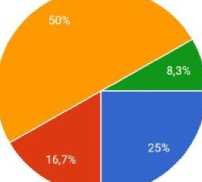
Which of the skill are you |O Копировать more confident about?
12 ответов
# Reading ф Listening ф Speaking
Ф Writing
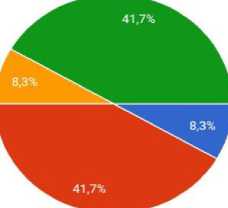
-
a)
what part seems difficult [D Копировать on speaking?
-
b)
What part seems difficult О Копировать on reading?
12 ответов
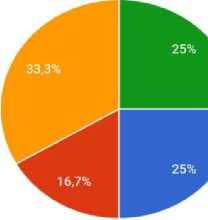
* Lack of vocabularies
* Anxiety in front of the people
# Not being able to comprehend the meaning of the terminologies
Ф Lack of practice with people while communicating
12 ответов
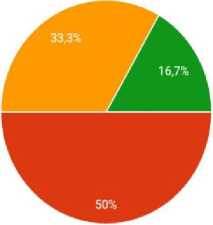
ф Understanding the whole meaning ф Understanding terminologies ф Problem with grammatical structures ф Lack of vabularies
c)
d)
Writing
30%
Speaking
40%
Reading
Finding: The diagram indicates in what level students are in and the percantages of skills they are good at and bad at
Based on the statistics, speaking is challenging for learners as they frequently pause and struggle with understanding terminologies. Writing emerges as the weakest skill among all, indicating significant difficulties in structuring ideas and expressing thoughts effectively.
2,1
7,2

8,2
6,3
Figure 3. Results of survey and interview
-
■ understanding the terminologies
-
■ pauses on sepaking
-
■ comrehending the reading texts
-
■ writing agreements or document

